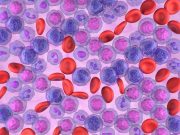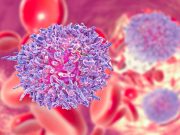Tag: Cancer: Leukemia
German Patient is 7th Person Probably Cured of HIV
Ophthalmologic Manifestations of Acute Leukemia Are Heterogeneous
Most common ocular manifestations are retinal hemorrhage and Roth spots
Immunoglobulin Replacement Therapy Beneficial for Blood Cancers
Reduction seen in hypogammaglobulinemia, infections or severe infections, and associated antimicrobial use
Posttransplant Cyclophosphamide GVHD Prophylaxis Beneficial in Leukemia
PTCy GVHD prophylaxis after allogeneic stem cell transplant yields comparable relapse incidence, lower GVHD
Improved Outcomes Seen With Ibrutinib in Chronic Lymphocytic Leukemia
Time to next treatment was improved for first-line ibrutinib versus chemoimmunotherapy in match-adjusted analyses
Trametinib Safe, Effective for Juvenile Myelomonocytic Leukemia
Seven of 10 children with relapsed or refractory JMML completed all 12 cycles of therapy or used trametinib as bridge to HSCT
ASCO: Asciminib Has Superior Efficacy to TKIs for Newly Diagnosed Leukemia
More patients receiving asciminib than investigator-selected tyrosine kinase inhibitor had major molecular response at 48 weeks
Oldest Adults With Acute Myeloid Leukemia Benefit From Venetoclax
Octogenarians and nonagenarians can be treated successfully with VEN-HMA
CD7 CAR T-Cell Therapy, Stem-Cell Transplant Beneficial for CD7-Positive Tumors
Six of 10 patients remained in minimal residual disease-negative complete remission after treatment
Ending Specialized Follow-Up Feasible in Asymptomatic, Low-Risk Leukemia
Those ending sFU had lower hospital visits per patient-year and longer time to first infection with no decrease in overall survival














